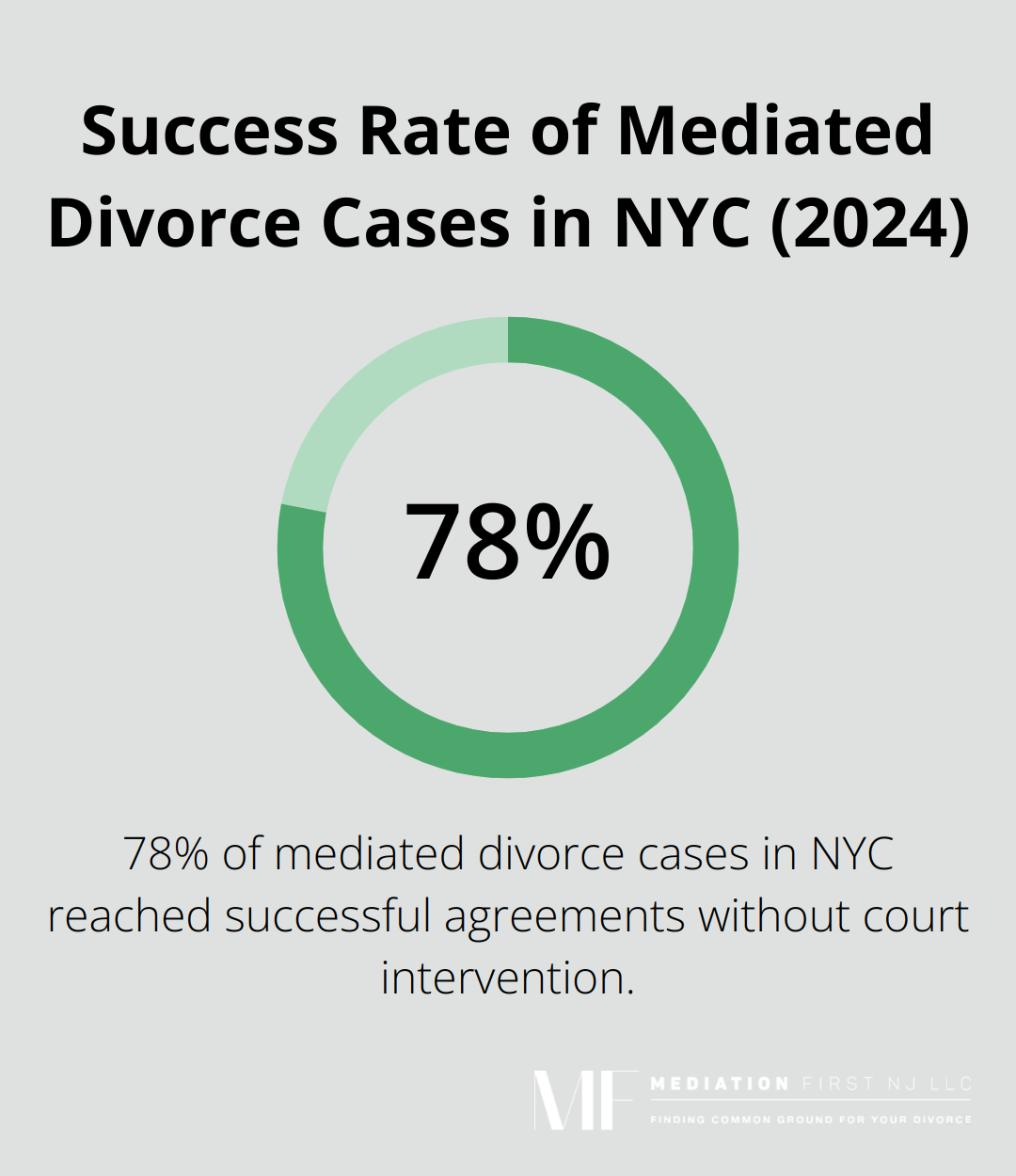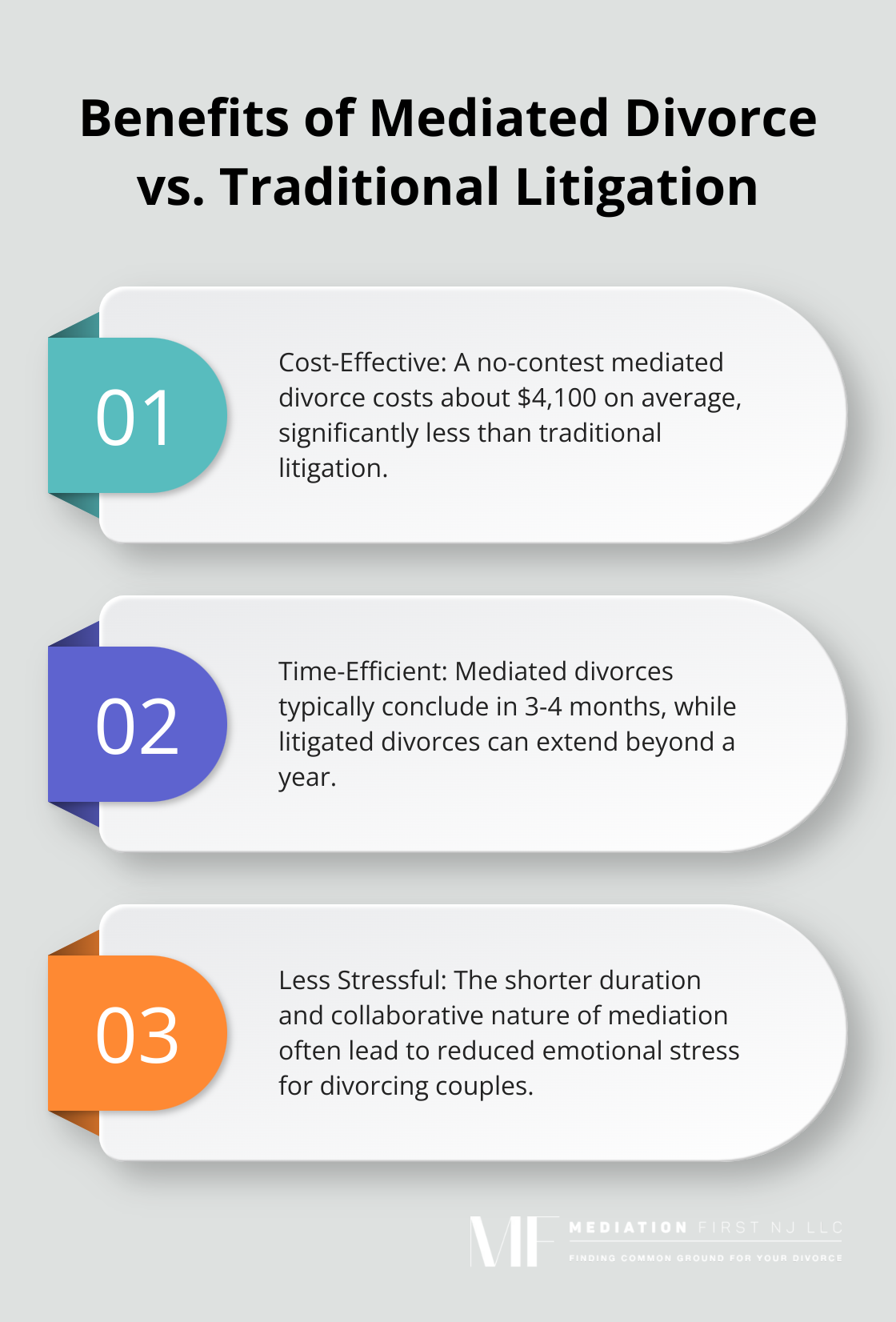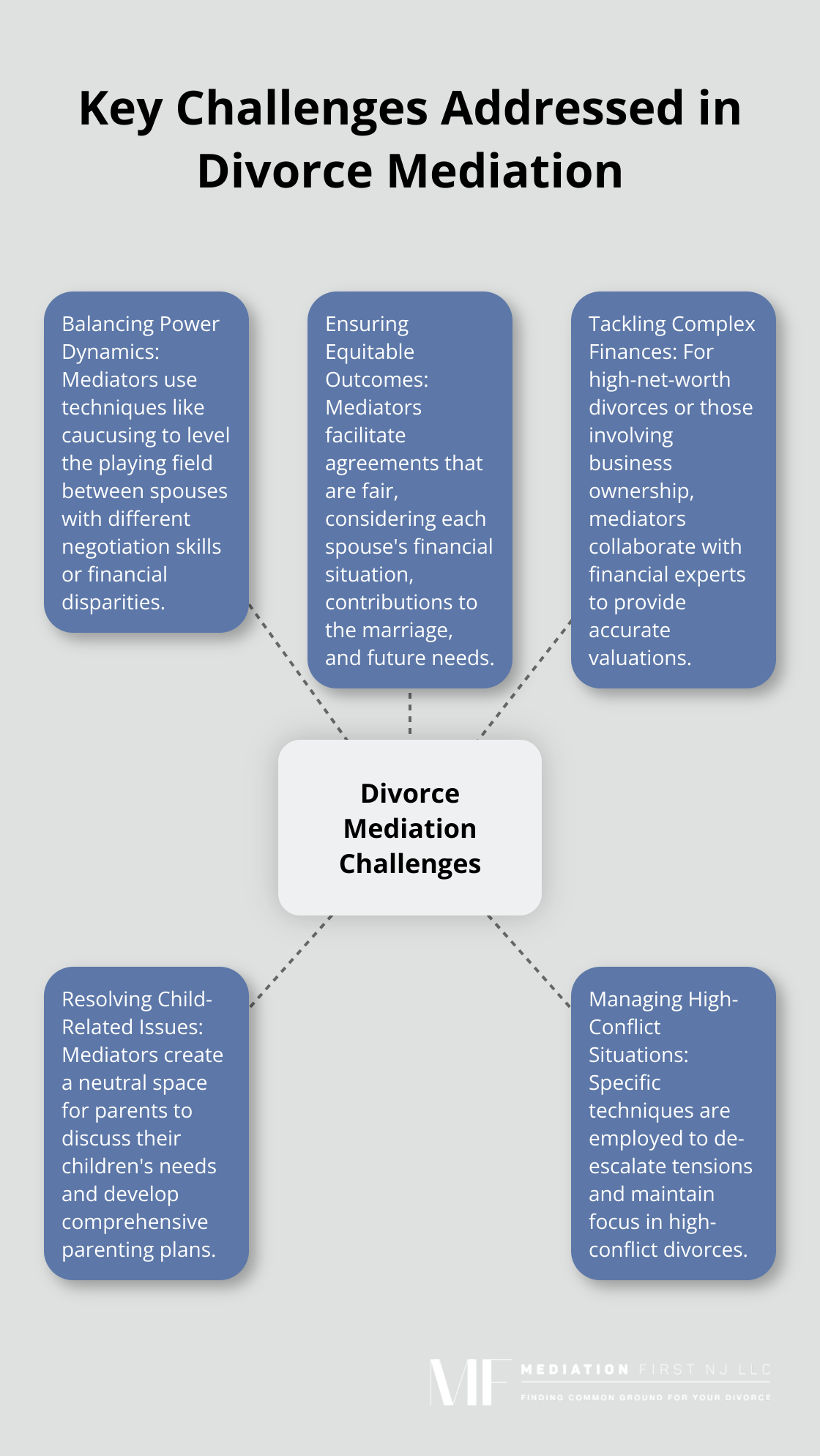Divorce can be a challenging and emotionally charged process. At Mediation First NJ LLC, we understand the complexities involved and offer a more amicable approach to resolving marital disputes.
This blog post explores how mediation works in divorce cases, providing insights into its benefits and addressing common concerns. We’ll guide you through the key steps of the mediation process, helping you make informed decisions about your divorce journey.
What Happens During Divorce Mediation?
The Initial Meeting
The process starts with an initial consultation. The mediator assesses the couple’s situation, explains the mediation process, and determines if mediation suits their case. This meeting allows the couple to ask questions and express concerns about the process.
Establishing the Framework
After both parties agree to proceed, the mediator sets ground rules and expectations. These guidelines ensure respectful communication and equal participation throughout the process. The mediator also outlines the confidentiality of the sessions, a significant advantage over court proceedings.
Pinpointing Key Issues
The next stage involves the identification of specific issues that need resolution. These often include property division, child custody arrangements, and financial support. The mediator helps the couple prioritize these issues and create an agenda for future sessions.
Information Gathering
The final preparatory stage involves the collection of necessary financial and personal information. This may include bank statements, tax returns, property valuations, and details about children’s schedules and needs. Full disclosure is essential for fair negotiations and reaching a comprehensive agreement.
In 2024, 78% of mediated divorce cases in NYC reached successful agreements without court intervention.
Preparing for Negotiations
With all the groundwork laid, couples can now prepare for the negotiation phase. This preparation often involves reviewing gathered information, considering potential compromises, and outlining personal priorities. (Some mediators may provide worksheets or guides to help with this process.)
The mediation process, while potentially intense, aims to be less adversarial than traditional litigation. It creates an environment where both parties feel heard and respected, which sets the stage for constructive negotiations in the sessions to come. As we move forward, we’ll explore the key benefits that make mediation an attractive option for many divorcing couples.

Why Choose Mediation for Your Divorce?
Financial Advantages
Mediation offers a cost-effective alternative to traditional litigation. A no-contest divorce will likely only cost about $4,100, according to Martindale-Nolo statistics. This significant reduction in expenses allows couples to preserve more of their assets for their post-divorce lives.
Time-Efficient Process
Mediated divorces typically conclude faster than court battles. While litigated divorces can extend beyond a year, the average mediated divorce wraps up in 3-4 months. This efficiency enables couples to move forward with their lives sooner (and with less stress).

Privacy and Control
Unlike public court proceedings, mediation sessions remain private. This confidentiality protects sensitive information and fosters more open discussions. Couples maintain control over the outcome, rather than leaving decisions to a judge who may not fully grasp their unique situation.
Creative Problem-Solving
Mediation allows for innovative solutions tailored to a family’s specific needs. Couples aren’t bound by rigid court formulas. For instance, some couples devise unique shared custody arrangements that accommodate irregular work schedules (something a court might not consider).
Reduced Emotional Stress
The collaborative nature of mediation often leads to less conflict. A study reevaluated the long-term effects of divorce mediation on adults’ psychological adjustment and investigated the relations among coparenting.
While mediation offers these benefits, it’s essential to work with experienced professionals who can guide you through each step. A skilled mediator ensures a fair and balanced process that prioritizes your family’s well-being.
As we explore the advantages of mediation, it’s important to address common concerns that may arise during the process. Let’s examine how mediation handles various challenges in divorce cases.
Navigating Challenges in Divorce Mediation
Divorce mediation, while beneficial, can present unique challenges. Let’s explore how skilled mediators address these issues to ensure a fair and productive process.

Balancing Power Dynamics
Power imbalances between spouses can significantly impact mediation outcomes. These imbalances might stem from financial disparities, emotional manipulation, or differences in negotiation skills. Skilled mediators use techniques to level the playing field. They might employ caucusing – separate meetings with each spouse – to ensure both parties can express themselves freely. Mediators often recommend that each spouse consult with an attorney to better understand their rights and options.
Ensuring Equitable Outcomes
Fairness stands as a cornerstone in divorce mediation. Mediators facilitate agreements that are equitable, not necessarily equal. This approach considers factors such as each spouse’s financial situation, contributions to the marriage, and future needs. Mediators often use financial software tools to model different scenarios and their long-term impacts. They encourage full financial disclosure and may suggest involving neutral financial experts to provide unbiased valuations of assets.
Tackling Complex Finances
High-net-worth divorces or those involving business ownership present unique challenges. In these cases, mediators often collaborate with financial professionals such as forensic accountants or business valuators. These experts can unravel complex financial structures, identify hidden assets, and provide accurate valuations.
Resolving Child-Related Issues
Child custody and support discussions can become emotionally charged. Mediators create a neutral space for parents to openly discuss their children’s needs. They help keep conversations focused on the kids, not personal grievances. They may introduce co-parenting communication tools or recommend child specialists to help develop comprehensive parenting plans.
Managing High-Conflict Situations
Some divorces involve high levels of conflict, making productive discussions challenging. In these cases, mediators employ specific techniques to de-escalate tensions and maintain focus. These might include setting strict ground rules, using shuttle mediation where parties are in separate rooms, or incorporating conflict resolution exercises. Educating couples about the impact of prolonged conflict (especially on children) can often motivate them to work towards more cooperative solutions.
Final Thoughts
Divorce mediation provides a faster, cost-effective, and less emotionally taxing alternative to traditional litigation. It empowers couples to control their divorce outcomes, fostering communication and collaboration even in challenging circumstances. The success of mediation depends on the mediator’s skill and experience to navigate complex matters and guide discussions toward mutually beneficial solutions.
At Mediation First NJ LLC, we understand the intricacies of how mediation works in divorce cases. We commit to helping New Jersey couples find amicable resolutions through open communication, fairness, and a focus on family interests. Our confidential and supportive environment allows couples to work through their differences constructively.
Mediation often leads to more satisfactory outcomes and sets a positive tone for future interactions, especially with children involved. It allows for creative problem-solving and tailored solutions that court-mandated decisions may not provide. We encourage couples facing divorce to consider mediation as a viable path forward, potentially improving family dynamics in the long term.

